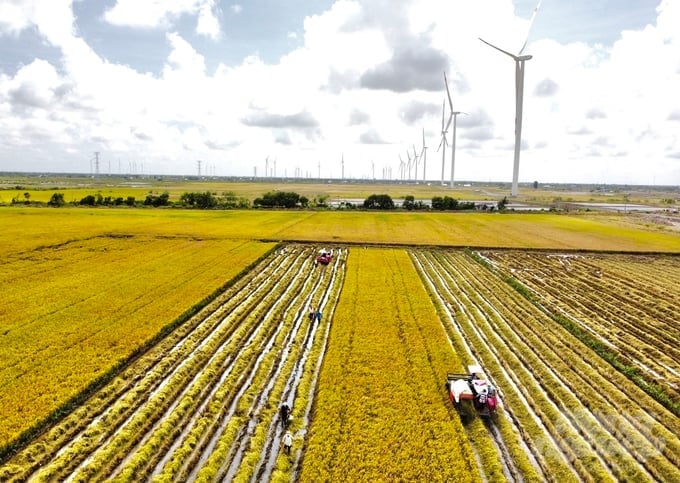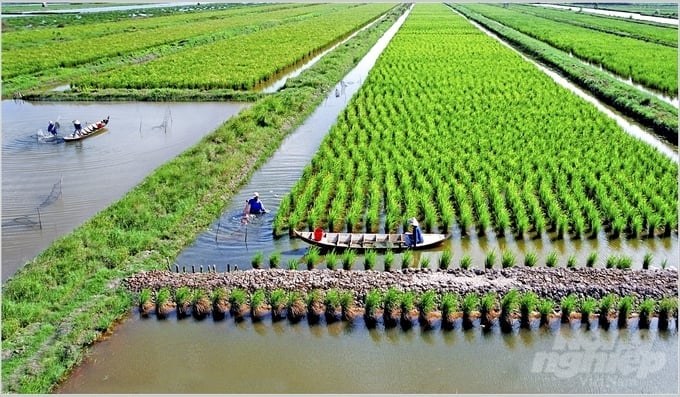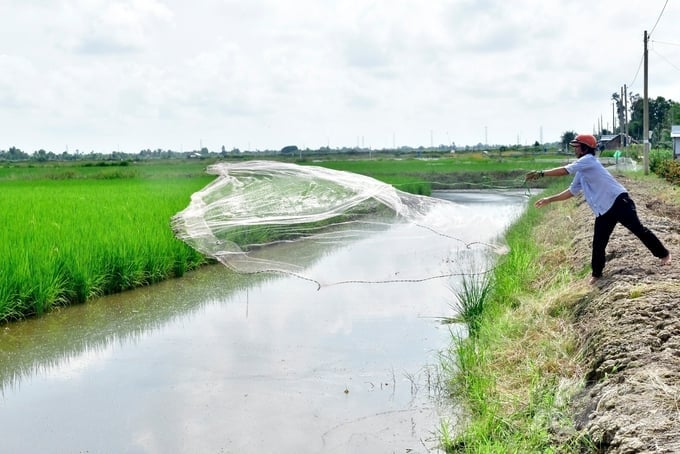June 17, 2025 | 09:45 GMT +7
June 17, 2025 | 09:45 GMT +7
Hotline: 0913.378.918
June 17, 2025 | 09:45 GMT +7
Hotline: 0913.378.918

The Government approved the One Million Hectares High-Quality Rice Project. Photo: Trong Linh.
Decision No. 1490, dated November 27, 2023, and signed by Deputy Prime Minister Tran Luu Quang, signifies a significant stride towards realizing this ambitious initiative. By 2030, the targeted cultivated area for high-quality, low-emission rice in the Mekong Delta is set to encompass one million hectares.
The overarching objective of this Project is to establish specialized, high-quality, low-emission rice cultivation areas amounting to one million hectares. This initiative aligns with restructuring the production system along the value chain, implementing sustainable farming processes to enhance production, increase value, and facilitate the sustainable development of the rice industry. Furthermore, it aims to improve production and business efficiency, elevate the income and quality of life for rice growers, safeguard the environment, adapt to climate change, and contribute to reducing greenhouse gas emissions, honoring Vietnam's international commitments.
Regarding sustainable farming: The Project outlines specific targets, including reducing the amount of rice seeds sown to less than 70 kg/hectare, minimizing chemical fertilizers and pesticides of chemical origin by 30%, and decreasing irrigation water usage by 20% compared to traditional methods. Implementing at least one sustainable farming process, such as One Must Five Reductions, Sustainable Rice Platform - SRP, alternate wetting and drying (AWD), and other standardized agricultural practices, is mandated across 100% of the designated area.
Regarding production organization: 100% of production areas specializing in high-quality and low-emission rice cultivation have production and consumption links between businesses and cooperatives or farmer organizations in production and consumption; the synchronous mechanization rate reaches over 70% of the area; over 1,000,000 households apply sustainable farming processes.
Regarding environmental protection and green growth: The post-harvest loss rate is less than 8%; 100% of straw is collected from the fields and processed for reuse; reduces greenhouse gas emissions by over 10% compared to traditional rice farming.
Regarding rice growers’ income and added value: Added value in the rice chain shall increase by 40%, of which the profit margin for rice growers reaches over 50%.
Regarding branding and export: The amount of rice exported with high-quality, low-emission brands accounts for over 20% of the total rice export of the entire specialized farming region.
The collaborative effort to cultivate one million hectares of high-quality rice spans the expanse of 12 provinces in the Mekong Delta, namely An Giang, Kien Giang, Dong Thap, Long An, Soc Trang, Can Tho, Bac Lieu, Tra Vinh, Hau Giang, Ca Mau, Tien Giang, and Vinh Long. With the recent official approval, the project has two strategic phases, each designed to ensure the project's success.

Ecological rice-shrimp model in Ca Mau. Photo: Trong Linh.
Phase 1 (2024 - 2025): This initial phase consolidates existing areas covered by the Vietnam Sustainable Agricultural Transformation Project (VnSAT), encompassing 180,000 hectares. Key activities include intensive training, planning, and establishing a Measuring-Reporting-Verification (MRV) system. The phase will also involve quantifying and piloting carbon credits for qualified rice areas, demonstrating a commitment to sustainable agriculture and environmental responsibility. Cooperative strengthening, the continuation of ongoing projects, and the strategic preparation for the subsequent period of 2026 - 2030 are included in Phase 1.
Phase 2 (2026 - 2030): A primary objective is the reduction of new emissions beyond the VnSAT Project area, accompanied by an expansion of an additional 820,000 hectares. This phase emphasizes key activities such as substantial investments in completing infrastructure for new areas, a comprehensive reorganization of production systems, the establishment of resilient value chains, and the fine-tuning of the MRV system. Phase 2 underscores the commitment to maintaining sustainable production practices within the project areas established from 2024 - 2025.
In the newly approved Decision, the Government assigned the MARD to preside and coordinate with relevant ministries, branches, and People’s Committees of provinces and centrally run cities in the Mekong Delta region. Under its leadership, the Ministry guides the organization and execution of the Project, working in tandem with localities and businesses to formulate detailed implementation plans. An annual summary report is to be presented to the Prime Minister, and a preliminary review of the Project's status in 2025, followed by a comprehensive overview in 2030, is organized by the Ministry.
In coordination with relevant ministries and branches, the MARD spearheads the formulation and execution of regulations for the measurement, reporting, and appraisal of greenhouse gas emission reduction. Aligning with international standards and the specific conditions of Vietnam, the Ministry develops and proposes pioneering policies and results-based payment mechanisms for carbon credits in specialized farming areas.

Rice cultivation follows an ecological and sustainable model in the Mekong Delta. Photo: Trong Linh.
The MARD is responsible for constructing a robust monitoring and evaluation (M&E) system anchored in the Project's output indicators and specific objectives. It leads collaborative efforts with relevant ministries and branches to secure funding from international organizations, ensuring the sustained progress and success of the Project.
The Ministry of Planning and Investment plays a key role in reporting to competent agencies and determining state budget investment capital allocated for development investments across industries and fields in the medium term. Additionally, it formulates the annual public investment plan, adhering to the stipulations outlined in the Law on Public Investment.
Focusing on fiscal responsibility, the Ministry of Finance oversees the allocation of non-business funding from the central budget. Drawing on proposals from the Ministry of Agriculture and Rural Development and other pertinent ministries, the Ministry of Finance submits these proposals to competent authorities, ensuring alignment with the provisions of the State Budget Law and related legislation.
Four criteria for selecting regions to participate in the Project:
1- Criteria for planning and infrastructure: Regions designated for participation must align with the land use planning period of 2021 - 2030, as outlined in provincial and Mekong Delta planning. These areas should possess a minimum contiguous land area of 50 hectares, supported by a well-established irrigation infrastructure system. Additionally, essential amenities such as electricity, telecommunications, and logistics infrastructure must be in place to support rice production, processing, and business activities.
2- Criteria for sustainable farming and green growth: Target regions must demonstrate a commitment to sustainable farming and green growth practices. Over 20% of the rice cultivation area in the proposed region should apply sustainable farming processes, such as One Must Five Reduction or AWD irrigation. Regions should comply with Sustainable Rice Platform (SRP) standards or certified good agricultural practice standards. Moreover, over 70% of rice cultivation areas should utilize certified rice varieties or equivalent, and 100% of households in the area must pledge to collect straw from the fields for processing and reuse.
3- Criteria for production organization: The linked area must encompass over 30% of the total area, with at least 50% of households participating in cooperative links. In addition, over 40% of households in the region should undergo training in sustainable farming processes, such as One Must Five Reduction, AWD irrigation, Sustainable Rice Production standards, or certified good agricultural practice standards. The active participation of agricultural extension organizations reinforces technical support for farmers.
4- Criteria for businesses participating in the association: Enterprises participating in the Project must have links with cooperatives or farmer organizations, particularly in terms of product consumption. These enterprises commit to active participation in the Project and must possess the organizational capacity to oversee and supervise the rice production process in the linked area.
Translated by Quynh Chi

(VAN) The UNESCO Global Geopark revalidation of Non nuoc Cao Bang and the transition to a two-tier administrative model are presently undergoing a pivotal moment in Cao Bang, the northernmost province of Vietnam.
/2025/06/13/5330-2-004539_953.jpg)
(VAN) Changing policy mindset and removing investment barriers are urgent requirements to open up new development space for enterprises in the agricultural sector.

(VAN) The areas include the restoration of five million hectares of marine ecosystems.

(VAN) Dr. Le Van Nguyen, Director of the Institute of E-Commerce Management (ECM), emphasizes the potential for green development through the cultivation of fruit trees, particularly in provinces such as Son La.

(VAN) VAAS and numerous Vietnamese enterprises have signed cooperation agreements with Japanese partners to promote agricultural technology and trade connectivity.
/2025/05/29/5625-12-214801_567.jpg)
(VAN) Provincial mergers in the Mekong Delta promise to streamline administration, expand inter-provincial raw material areas, and foster close linkages in agricultural value chains, benefiting both businesses and cooperatives.

(VAN) Merging Mekong Delta provinces contributes to the expansion of agricultural raw material areas, addressing previous constraints caused by provincial boundaries. Additionally, this expansion will reduce costs and strengthen linkages between businesses, cooperatives, and farmers.